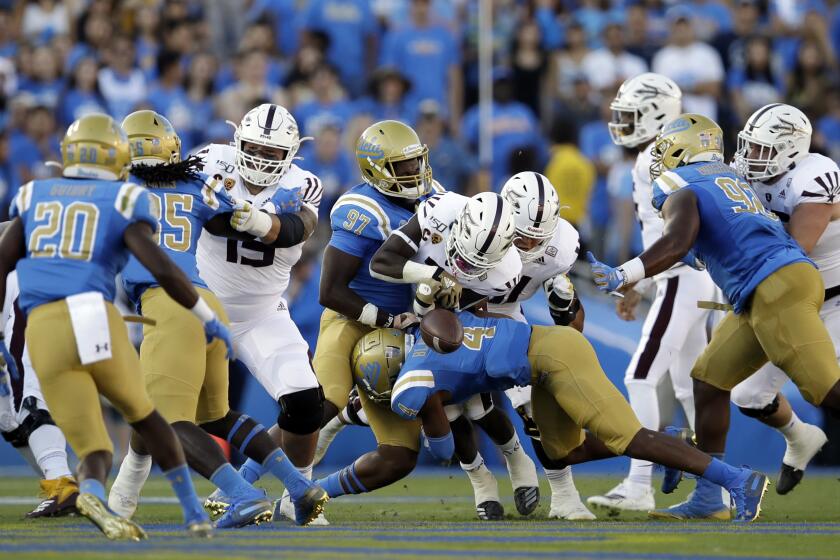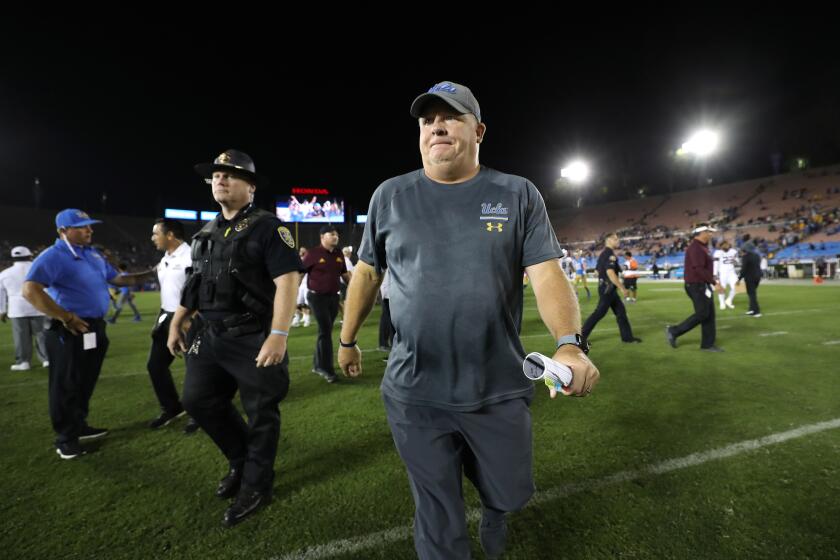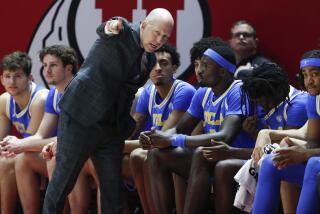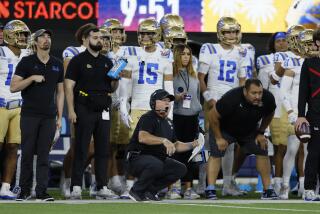Chip Kelly has an explanation for UCLA’s abysmal start given its recent surge
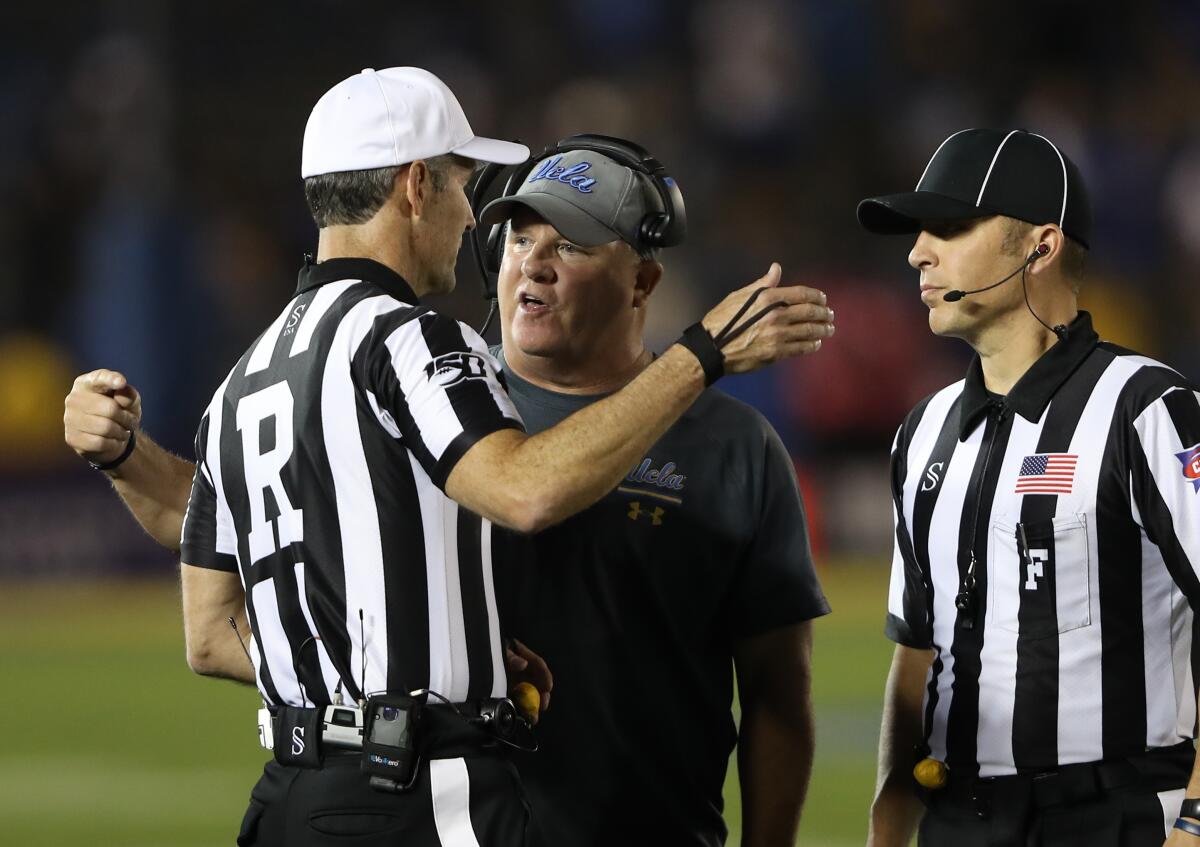
- Share via
One trend is starting to crystallize under Chip Kelly: His UCLA teams stumble early and finish in a dead sprint.
It was understandable last season, the coach’s first on campus, that the Bruins would struggle in their opening months before closing on an upward trajectory.
But UCLA’s arc took a Black Monday dip to start 2019, going winless in nonconference play and compiling a 1-5 record for a second consecutive season, before enjoying another significant uptick in productivity. The Bruins (3-5 overall, 3-2 Pac-12 Conference) have won two consecutive games and appear capable of beating anybody left on their schedule heading into another home game Saturday against Colorado (3-5, 1-4).
What took them so long?
UCLA headed into 2019 with 10 returning starters on defense and seven on offense. Did the Bruins really need 1½ months to become a competent team?
Yes, according to Kelly.
“You just can’t write the narrative before the season starts,” Kelly said Monday. “I don’t know how you can even think that way. That’s just kind of preposterous if you don’t give any credit to the other teams that you play.”
There was plenty to celebrate Saturday night at the Rose Bowl after UCLA’s once-beleaguered defense delivered a second consecutive strong performance.
Kelly noted how the Bruins played perhaps the toughest nonconference schedule among Pac-12 teams, adding that Cincinnati, Oklahoma and San Diego State all have only one loss and are nationally ranked.
“Maybe if we played easier teams before we got into league play then our record would be different,” Kelly said, “but I don’t look at it that way or compare it that way or say, ‘How come it took awhile to get going?’ Every season expresses itself in a different manner.”
Early losses are one thing, but the Bruins continued to trip over themselves all the way into October. They lost to an Arizona team starting a second-string quarterback and an Oregon State team that was considered the worst in the Pac-12 before the Bruins briefly assumed that designation.
There’s an explanation for such madness?
Yes, according to Kelly.
“We do have a lot of younger players playing,” Kelly said, though he did momentarily restrain himself from mentioning his team’s 87 freshmen and sophomores. “Sean Rhyan didn’t play last year, Duke Clemens didn’t play last year, Jaylen Erwin’s new to us, we lost Theo Howard, we lost Quentin Lake, we lost a lot of kids that played a lot of football for us and how do you replace those guys and how do those other guys continue to grow as a group?”
They’ve sprouted impressively, to be sure. It’s just that the buds didn’t break until the season teetered on the edge of massive disappointment.
He’ll be fine
Last seen limping around the Rose Bowl, Dorian Thompson-Robinson appeared to be just fine Monday.
The quarterback who was knocked out of UCLA’s 42-32 victory over Arizona State early in the fourth quarter with an apparent knee injury practiced with his teammates two days later. He wore a brace over his left knee but rolled out and flung passes as if nothing were amiss.
UCLA’s latest victory — a 42-32 triumph over No. 24 Arizona State — signals that just maybe the Bruins are figuring out things under coach Chip Kelly.
UCLA listed him as the starter for the Colorado game on its depth chart, without the dreaded “Or” designation that might imply that backup Austin Burton was in consideration.
Thompson-Robinson was hurt on a read-option play in which he opted to take off running. Kelly acknowledged that he would speak with Thompson-Robinson about better protecting himself.
“You’ve got to protect yourself,” Kelly said, “when you get out into the open field.”
Practice not affected
UCLA’s morning practice was not impacted by the nearby Getty fire, even though classes were canceled and an evacuation order was issued for anyone who lived north of Sunset Boulevard on the edge of campus.
“We’re always cognizant of where they are and we get a reading from the university on air quality and they tell us what level it is and can we train outside or not train outside,” Kelly said of wildfires. “So they monitor that all the time.”
Etc.
Running back Demetric Felton Jr. and defensive lineman Elijah Gates worked out on the side of the field with a trainer during the portion of practice that reporters were allowed to observe. Receiver Kyle Philips sprinted in the end zone without a helmet, indicating that he was recovering from an unspecified injury. … Kelly, on whether he felt the targeting call on defensive back Jay Shaw late in the Arizona State game was correct: “I’m not allowed to feel.”
More to Read
Go beyond the scoreboard
Get the latest on L.A.'s teams in the daily Sports Report newsletter.
You may occasionally receive promotional content from the Los Angeles Times.

